Independence is a major perk of being an adult. Our ability to live our lives, without the need for assistance, is something that all grown-ups can appreciate. However, illness, disability and age can seemingly take this away without warning. These circumstances may require help outside of our scope of abilities. One of the best solutions that can help us confront these hardships are medical alert systems. With the use of a medical alert system, the elderly and disabled can live fully independent.
Over the past decade, there has been significant technological improvements within the ambulatory care sector. As such, the number of available systems and options has skyrocketed. In this article, we will examine the five top medical alert systems. We will provide you with information that should make choosing the correct medical alert system quick and easy.
5 Best Medical Alert Systems
- MobileHelp – Editor’s Choice
- Medical Care Alert – Award-Winning Customer Service
- LifeFone – Honorable Mention
- Getsafe – Voice Activated Support
- Bay Alarm Medical – Low Entry Option
How We Formulated Our List
While the concept of a medical alert system is well known and has been replicated many times, not all medical alert systems are created equal. Several factors may improve the overall experience that a customer has with a particular medical alert system. To make these factors easier to understand, we have broken this section into five main parts.
Customer Experience
Customer experience makes up a large part of the overall satisfaction towards a new medical system. There should be a continued level of care and professionalism present during your purchase journey. The sales representative must be willing to listen and answer any concerns you might have, and if they are unable to do so, then you should consider searching for alternative options.
Equipment
Before you purchase your new medical alert system, you should carefully examine the features of the product. While most systems are almost identical in physical make-up, there are differences in battery life, device durability, audio quality and the range of the signal. As a fully functional medical alert system could mean the difference between life and death, you must ensure that the equipment that you are buying is of the best quality that it can be.
Around The Clock Monitoring
Monitoring plans are another facet of medical alert systems. Different companies will have different ways in which they approach this aspect of home-monitoring. Landlines and mobile phones may be linked to a 24/7 dispatch center or in some cases there might be the option of equipping your device and other phones with GPS tracking systems. The type of monitoring plan that you agree upon must be tailored, not only to your personal needs but also your budget, as some plans are an additional expense.
Customer Reviews
Reviews are an essential part of purchasing your medical alert system. They allow you a quick snapshot of what life could be like with the company being reviewed. Often, difficulties and issues you would not have thought of are expressed on review sites, and you must do your research. Good customer reviews can point you in the direction of a medical alert system that you will feel safe owning.
Response Times
One of the most important aspects of owning a medical alert system is in the response times. In the case of an injury, be it a simple fall or a more complicated medical emergency, you would expect the company to respond to an alarm as quickly as possible. Company’s response times could prevent further harm from befalling their client, and as such, it is essential to choose a company who responds swiftly and professionally. Because while a few seconds may not seem like much, they could be life saving.
Best Medical Alert Systems – Brand Reviews
1. MobileHelp – Editor’s Choice
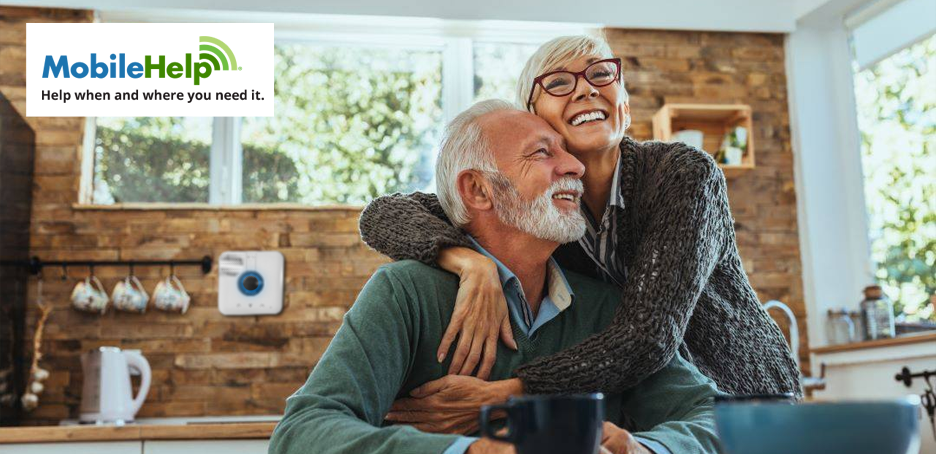
Pros:
- 24/7 Emergency Support And Monitoring
- Smartwatch Available
- Free Equipment
- Risk-Free 30 Day Trial
Cons:
- Expensive Equipment Replacement (the costs are lower only if you are a member of their protection plan)
The medical alert system offered by MobileHelp has the best reviews from customers of any on our list, and it is no surprise as to why. The 30-day trial allows customers to become better acquainted with all that company has to offer. This is done so that if the service is not for them, it can be returned free of cost.
The offer of a smartwatch is another factor that has boosted the company’s standings as the accessory allows a level of privacy for the client while they are still being monitored. MobileHelp offers three main plans for customers to choose from while providing clients with an online portal that can be accessed by the client themselves or concerned friends and family.
MobileHelp has even offered a new platform in response to the COVID-19 crisis. For an extra $9.95 per month, seniors and the vulnerable who are wary of leaving their homes can access a physician 24 hours a day, along with other virtual options to help with any request.
MobileHelp also offers medication reminders as an optional service for those who need it.
Added to round the clock monitoring, the free equipment and set-up options, it is no surprise that customers would love this alert system.
It should be noted that in cases where equipment becomes damaged, without a protection plan, MobileHelp’s prices for replacement or repair are somewhat expensive.
2. Medical Care Alert – Award-Winning Customer Service
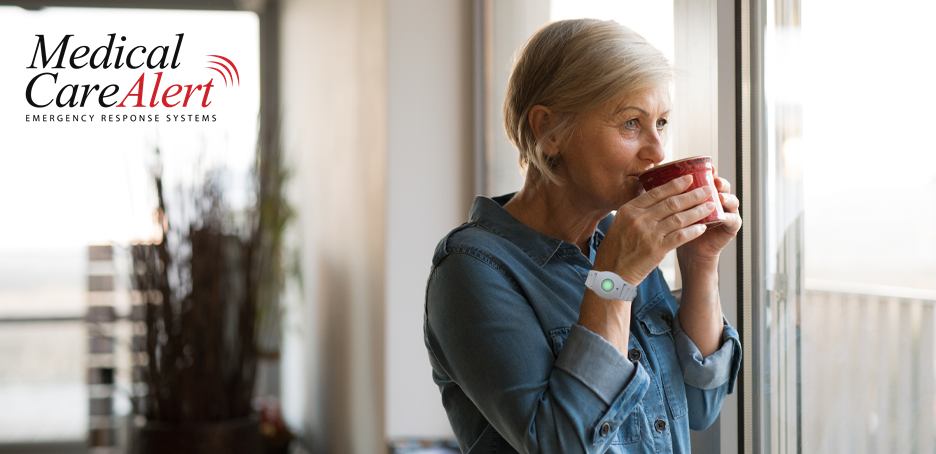
Pros:
- Fall Detection Technology
- Roaming GPS Plan
- Extended Range Offered
- All Agents Are EMT/EMD Certified
Cons:
- Shorter Than Usual Trial Period
One of the unique factors that sets Medical Care Alert apart from other medical alert systems is its GPS service. Medical Care Alert offers three main packages with the Home & Away option allowing for coverage wherever the customer roams as long as it’s in the USA. This feature makes the company particularly desirable to those who enjoy travelling for leisure or work.
In addition, the Home & Yard option allows for an extended signal range to be added to the already comprehensive coverage.
The free lockbox offered by Medical Care Alert means that agents who are responding to an emergency can enter the property without damaging the client’s home. Medical Care Alert has also ensured that all its agents are either EMT or EMD certified, making them more than capable of dealing with any situation.
The packages offered by Medical Care Alert also includes fall detection, 24/7 monitoring and a trial period where if the client isn’t happy with the service they can return it for a full refund.
The company even has a price lock guarantee to assure customers that their costs won’t suddenly skyrocket overnight.
One of the disadvantages of the Medical Care Alert package is the time offered for a trial period. Most companies allow clients to use their medical alert systems for up to 30 days, while Medical Care Alert has a 14-day trial period.
Learn more at MedicalCareAlert.com
3. LifeFone – Honorable Mention
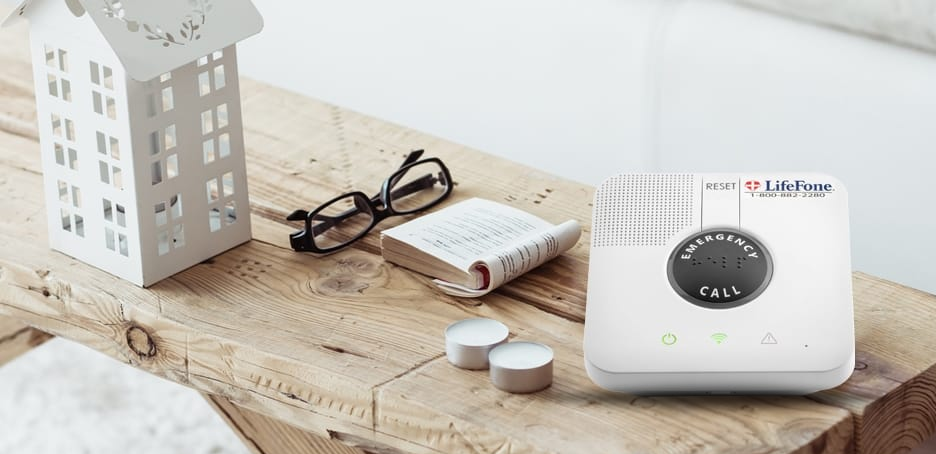
Pros:
- Lifetime Price And Equipment Guarantee
- No Activation Fees
- Excellent Equipment Range (1,300 feet)
- Waterproof Pendant And Wristband
Cons:
- Service Only Operates In English
Of the medical alert systems that we’ve examined, Lifefone is the only one that offers not only a lifetime price guarantee but also a lifetime equipment guarantee. These features are just two of the many reasons customers are flocking to the systems that Lifefone offers.
Along with their brilliant guarantee, Lifefone also boasts one of the largest signal ranges of up to 1,300 feet. Added to the offered GPS unit and affordable pricing, Lifefone is a company to watch when it comes to medical alert systems.
Lifefone offers four types of systems for clients to choose from, all of which come equipped with the option of fall detection. Lifefone also offers free spouse coverage with many of their bundles tailored towards use by couples, active or otherwise.
With no activation fees, around the clock monitoring and a 30-day money-back guarantee, Lifefone not only provides quality but also the peace of mind of knowing that if the service doesn’t suit the client it can be easily returned.
In addition, Lifefone offers waterproof pendants and wristbands and has one of the fastest response times in the medical alert system field, thus enhancing the saleability of its packages.
But while Lifefone’s customer accommodation is one of their selling points, the service only operates in English, making it unsuitable for a wide variety of individuals. The affordable pricing offered by Lifefone also takes a hit when the price of any additional equipment is taken into account.
4. Getsafe – Voice Activated Alert System
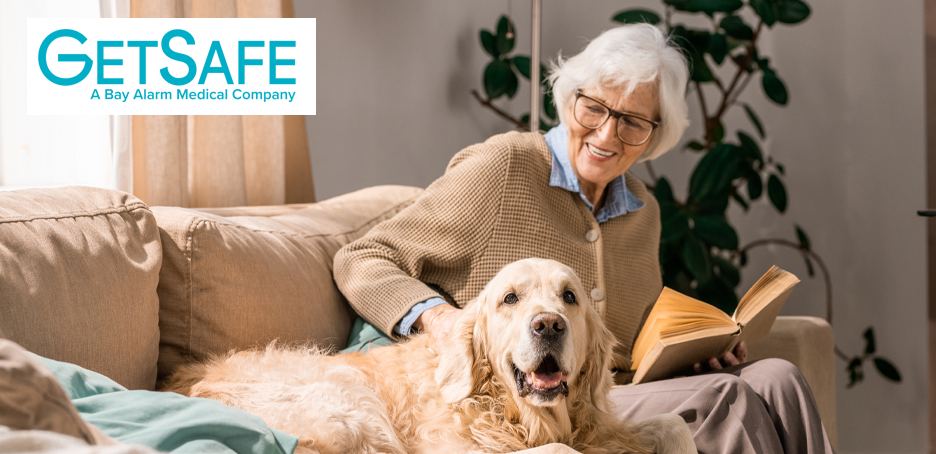
Pros:
- Flexible Payment Options
- Voice Activated Alert System
- Fast Response Time
- 30-day Money-back Guarantee
Cons:
- No Mobile or Web App
Getsafe is the company for clients who don’t want to wear pendants or buttons to alert their system. Instead, the company offers wall buttons and voice-activated mini consoles that can be placed around the home. These mini-consoles can be activated by using the phrase “call 911 call 911” or via the push of a button.
Getsafe also offers the traditional wearable option for clients who would feel more comfortable using them. The offered buttons are waterproof and durable with the added chance to customize with fall detection technology.
The base unit provided by Getsafe is an amplified speaker with a sensitive microphone that allows for 2-way voice communication in the case of an emergency.
The installation of the Getsafe medical alert system is simple. According to Getsafe, it requires a how-to tutorial video that the company offers on its site.
There is also the offer of flexible payment options for those who need it, and if the services offered by Getsafe don’t suit you, the company has a 30-day money-back guarantee.
But despite these features, Getsafe lacks the web and app-based content that most other medical alert systems offer. The overall cost of the medical alert system offered by Getsafe is quite expensive when compared to others and this price only climbs if any additional pieces of equipment are needed by the client.
Also, unlike many other companies, Getsafe charges the customer for the equipment they are receiving, making it one of the most expensive companies for medical alert systems.
5. Bay Alarm Medical – Low Entry Option
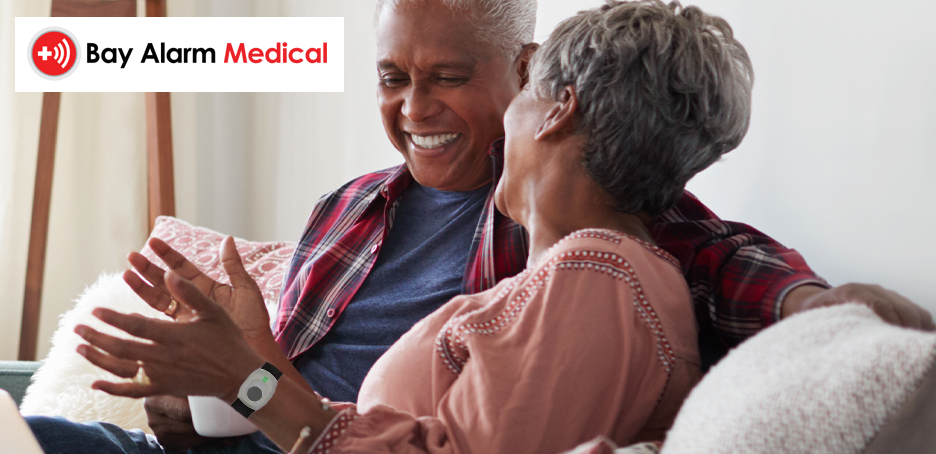
Pros:
- Lower Pricing
- Free Monitoring For Spouse
- In-Car Alert System
- Price Lock Guarantee
Cons:
- Shipping Costs
- Lesser Known History
As the last medical alert system offered on our list, Bay Alarm Medical is the lowest price. Packages from Bay Alarm Medical start from $19.95 a month. A significantly low figure when compared to the prices offered by other medical alert systems. In addition to their already low monthly prices, Bay Alarm Medical does not charge for their equipment, and they have also offered a free mask to all new clients.
Bay Alarm Medical’s packages are split into three main categories that focus on home, travel and bundles. Each category has unique features such as the in-car alert and GPS Help Button offered to clients whose plan focuses on travelling.
Bay Alarm Medical also offers wall buttons and lockboxes alongside their Bella Charms which transform the usual pendant into a stylish accessory that can be worn without detection for the more private clients.
Bay Alarm Medical has always offered a high level of customer service with caring and attentive agents who have prompted happy reviews from their clients. The reputation of the company is further boosted by its offer of free spousal coverage, and a 30-day free trial period for those who would like to test out the company’s capabilities before signing up.
With an impressive battery life and range of up to 1,000 feet, Bay Alarm Medical has etched out a place among some much larger providers of medical alert systems.
How Does A Medical Alert System Work?
Generally, a medical alert system is a device worn on the body or placed on a wall that functions as a communication system linked directly to those who can provide help. When triggered, the wearable factor of the device (or in some cases the voice-activated system) will send a message to the alarm monitoring system. This monitoring system will then forward an alarm or pre-recorded message to the company monitoring the medical alert system, family members or carers, indicating that help is required.
Components Of A Medical Alert System
Medical alert systems have various parts and components that can sometimes make researching a particular system confusing. To simplify this, we have identified the various components and explained the use of each below:
Home Base
Also known as the base unit or console, this piece of equipment is the focal point of any Home-Based medical alert systems. The home base may vary in size and shape from company to company, but its use remains the same.
It functions as a digital communicator that receives signals from transmitters stationed around the house, but it can also be activated by pushing a button. The console is a 2-way communicator that will alert the monitoring company when an alarm is triggered. Most units include a microphone which allows the client to talk directly to the agent if they are within range of the home base’s system.
Transmitters
These can be wearable or wall-mounted items. The transmitters are fitted with an emergency button or in some cases, they may be voice-activated. Pressing the button or saying a particular phrase will send a message directly to the home base which will then send an alarm to the company monitoring the system. Transmitters come in many shapes and forms, from pendants to watches and wall-mounted sensors.
Fall Detection Technology
Most medical alert systems use gyroscopes, accelerometers and sensors to indicate if a client has had a fall. Fall detection Technology is often added to wearable transmitters, but it will also use sensors to make sure that the readings are correct. If the technology detects a fall, it will automatically contact the monitoring company. This is done in case the client is unconscious and unable to call for help.
Smoke And Carbon Monoxide Monitoring
To ensure the safety of clients many companies have included sensors that will detect the presence of smoke and carbon monoxide. While these sensors are not always part of core packages, they are usually available as an extra.
GPS Monitoring
Many companies have incorporated GPS tracking software into wearable transmitters to make sure that they are aware of their client’s location in the event of an emergency. This is often offered as an extra with an additional charge, but considering the information it provides, it is worth the money.
Types Of Medical Alert System
There are three main types of medical alert systems, these are:
- Mobile Alert Systems – Mobile Alert Systems are medical alert systems that do not require a base station. Instead, such systems use cell coverage to relay information about a potential emergency or incident to the company in charge of monitoring the client.
While the options surrounding the systems may change depending on the parent company, for safety purposes, the mobile alert system should have a GPS tracker to indicate where the client is located. The system should also be waterproof and include fall detection technology. - Home-Based Medical Alert Systems – Home-based systems are the more traditional approach to medical alert systems. These systems include a base station with a 2-way speaker, along with a wearable component such as a pendant or smartwatch that can communicate with the base station in case of emergency.
Home-based systems can be used with a landline or a mobile phone dependent on the client’s wishes. Most home-based systems also include fall detection technology, but where it isn’t included, it is usually offered as an extra that can be added to the pre-existing package. - Fall Detection Systems – Fall detection systems are often found as part of the home-based and mobile alert system packages. As the name suggests this technology can detect when a fall has occurred and alert the proper authorities or the monitoring company. This is extremely important in cases where the client is unconscious or simply unable to trigger an alarm themselves.
To give a correct indication of a fall, the technology not only utilizes the wearable component of the medical alert system, but it also uses the sensors to make sure that readings are correct. All vulnerable and elderly individuals must include fall detections as part of their medical alert system package because while it might trigger when not needed, the technology could also possibly save lives.
How To Choose The Right Medical Alert System?
Several factors should be considered when choosing a medical alert system:
- The essential issue to keep in mind when selecting a medical alert system is the client’s overall needs. This means having frank discussions about health, mobility issues, any previous accidents or falls. You require a good understanding of the support needed as this will affect any package you potentially choose.
- Questions of, whether or not 24/7 monitoring is needed, or if fall detection should be a necessary addition to your medical alert system, should be asked. The use of lockboxes and wearable components vs wall buttons or voice-activated sensors should also be discussed.
- Having a complete picture of the needs of the person requiring the medical alert system beforehand is essential in choosing the correct package for you and your family.
- The mobility of the client is another issue to examine. Clients who spend most of their time at home, due to medical reasons or simple choice, would be better off with a Home-based medical alert system. On the other hand, clients who are constantly on the move and who travel regularly would be better served using a Mobile Alert system.
- The client’s budget is another aspect that needs to be remembered. Dependent on the client’s needs, some packages may be more expensive than necessary. In this case, shopping around is essential.
Most companies that offer medical alert systems have plans and bundles that can be customized so the client’s needs are always covered. Discussing the requirements you have with a sales representative while making them aware of your budget is an easy way to get an idea of which company would be most financially suitable for you to sustain.
Conclusion
In conclusion, the world of medical alert systems is an ever-growing and changing field. With new companies and technology emerging every day, there should be no compromise on a client’s safety and happiness.
Our lists and explanations should therefore act as a guide to help you choose the medical alert system that is best for you, or at least help to familiarize you with the concepts and offers you should expect when searching for a medical alert system.


